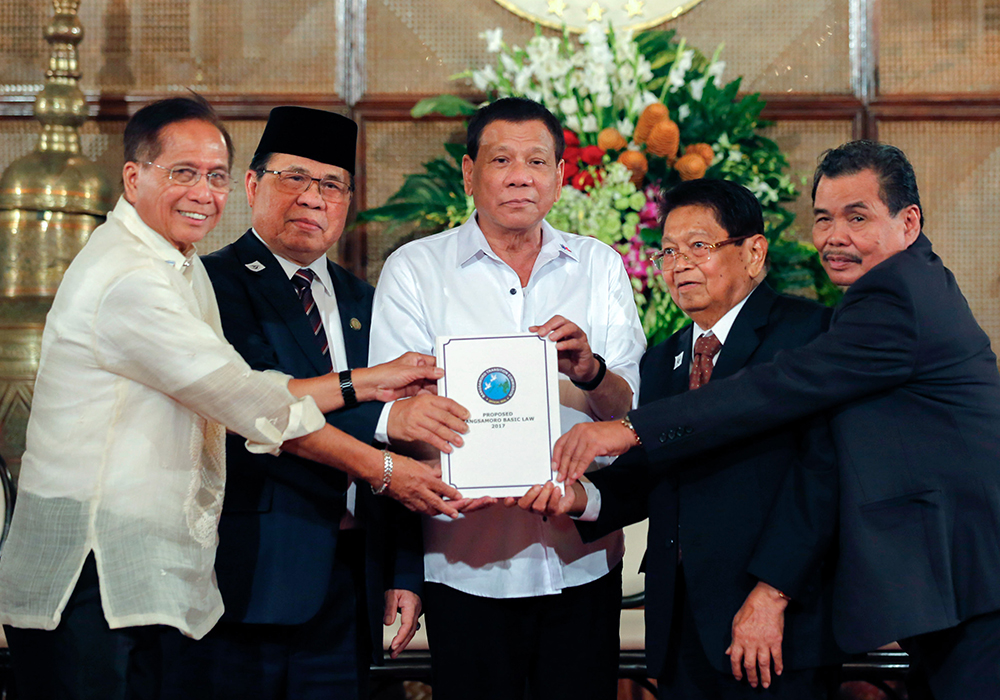
President Rodrigo Duterte received a draft of the newly proposed Bangsamoro Basic Law (BBL) in a turnover ceremony at the Rizal Hall in Malacañang Palace on July 17, 2017. Joining the President are (from left) Presidential Adviser on the Peace Process Jesus Dureza, Moro Islamic Liberation Front (MILF) Chairman Murad Ebrahim, Bangsamoro Transition Commission (BTC) Chair Ghazali Jaafar, and MILF Peace Implementing Panel Chair Mohagher Iqbal. (Malacañang file photo)
MANILA, Philippines – Peace activists and Bangsamoro Basic Law advocates on Tuesday appealed to the bicameral committee on Bangsamoro Basic Law (BBL) to grant “meaningful autonomy” to the Bangsamoro to achieve just peace and social justice in Mindanao.
The All-Out Peace (AOP), a network of various peace and civil society organizations based in Mindanao and Manila, delivered an open letter during the peace rally held today in front of the venue of the bicam meetings at Crowne Plaza Hotel on Ortigas Avenue in Pasig City.
The group urged the 26-member panel to craft a BBL that “substantially reflects and recognizes the fundamental rights and freedoms of the Bangsamoro, the indigenous peoples, and all other inhabitants of Mindanao of their inherent right to self-determination and self-governance.”
“Denying them their inalienable right to chart their own political destiny and govern themselves as a people in accordance with their distinct cultural identities, beliefs and traditions is to also deny an opportunity for the whole nation to once and for all heal the wounds of violent conflict and achieve genuine peace,” they stressed.
The joint panel begun its work on Monday, and is expected to finish its harmonized version of Senate Bill 1717 and House Bill 6475 on Wednesday evening, July 11.
Bangsamoro Transition Commission (BTC) Commissioner Maisara Damdamun-Latiph called on lawmakers to strengthen the BBL on the following components:
-
Fiscal Autonomy by removing the conditions in the Block Grant, making it at par with the IRA (internal revenue allotment of local government units (LGUs);
-
Proper allocation of powers in accordance with the Comprehensive Agreement on the Bangsamoro (CAB) and not less than the Autonomous Region in Muslim Mindanao (ARMM)
-
Stronger policing in relation to Normalization and Decommissioning;
-
Inland Waters like Lake Lanao in relation to preservation, conservation, power generation, and regulation; and
-
Territory on the Plebiscite of 6 Municipalities of Lanao del Sur and 39 Barangays of North Cotabato in accordance with CAB
-
Bangsamoro identity
No more anti-political dynasty provision
So far, the panel has agreed to delete the bill’s anti-political dynasty provision. Senate Minority Leader Franklin Drilon branded this provision as “useless” as it does not really curb dynastic behaviors. Senator Francis Escudero said it was struck down by the panel because it was “selective, discriminatory and ineffective.”
Under Article VII, Section 15 of SB 1717 “no Party Representative should be related within the second (2nd) civil degree of consanguinity or affinity to a District Representative or another Party Representative in the same Parliament.”
HB 6475 does not have an anti-political dynasty provision.
The panel has also reached a consensus to enhance the powers given to the Bangsamoro under the ARMM Law.
“In other words, we don’t want an ARMM minus, we want an ARMM plus… that actually is both appreciated by both the MNLF (Moro National Liberation Front) and the MILF (Moro Islamic Liberation Front),” said Senate Majority Leader Migz Zubiri, who is also one of the chairs of the panel.
75-25 share in taxes
Zubiri said the panel also agreed that 75 percent of the national government taxes, fees, and charges collected in the Autonomous Region in the Bangsamoro, other than tariff, and customs duties, would be given to the Bangsamoro government, while 25 percent would go the the national government.
Freedom of religion, block grant, Bangsamoro regional police
Aside from this, the panel has also agreed to adopt a provision that would allow the promotion of freedom of religion in the proposed Bangsamoro government, as well as the retention of the automatic appropriation of the annual block grant or development fund for the Bangsamoro government, without any “reportorial requirement.”
The block grant is the 5 percent share of the Bangsamoro government from the national internal revenue of the government, which Zubiri earlier said was pegged at P72 billion.
Zubiri said the uniformed services in the Bangsamoro would still be under the direct command of the Philippine National Police.
Territory and plebiscite
Zubiri said they would hold their deliberations on the controversial provision on territory and plebiscite until Wednesday.
Some moros preferred the “opt-in” proposal in the Senate version of the BBL, that would allow 39 barangays in North Cotabato and six towns in Lanao del Norte to join the envisioned Bangsamoro region following a plebiscite. Some district representatives strongly opposed this.
The House version of the BBL has a similar provision wherein local government units (LGUs) may only join the Bangsamoro if their mother province or town also votes in favor of inclusion. (davaotoday.com)










